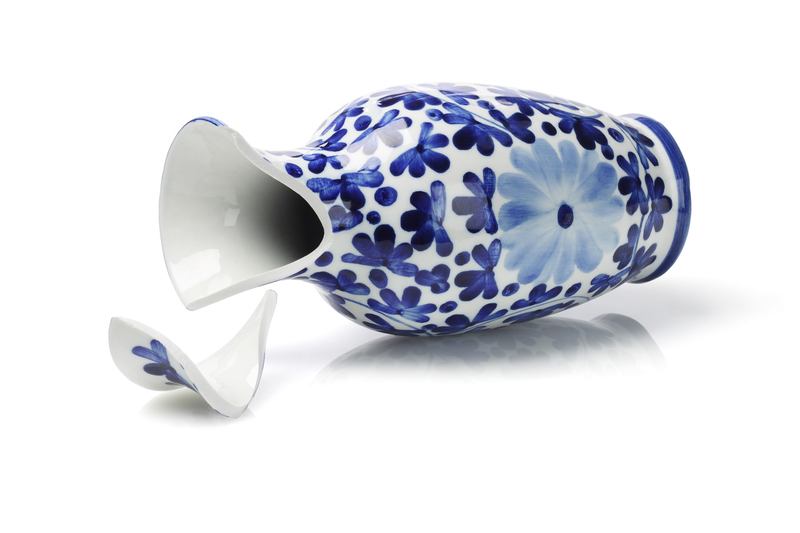Optimal Storage Solutions for Unused Freezers
Posted on 22/06/2025
Optimal Storage Solutions for Unused Freezers
Are you looking for optimal storage solutions for unused freezers? Whether you're downsizing, upgrading your appliances, or simply need to temporarily store your deep freezer, figuring out the best way to store a freezer that's not in use can be a challenge. Not only do you want to make sure the appliance remains in good condition, but you also want to maximize your storage space and ensure safety. In this comprehensive guide, we'll cover every aspect of unused freezer storage--from preparation and placement to long-term maintenance and creative alternative uses.
Why Proper Storage for Unused Freezers Matters
Before diving into the best storage solutions for unused deep freezers, it's important to understand why thoughtfully storing your freezer is so crucial. Improper storage can result in:
- Mold or mildew growth due to residual moisture
- Musty odors that are tough to remove
- Damaged seals and other mechanical issues
- Physical damage to the exterior or interior
- Reduced appliance lifespan and functionality
By taking a few proactive steps now, you'll keep your appliance safe and ready for use in the future.

How To Prepare Your Freezer for Storage
1. Clean and Defrost Thoroughly
The first--and most important--step in preparing unused freezers for storage is cleaning and defrosting the unit. Follow these steps to ensure your freezer is spotless and dry:
- Unplug the appliance at least 24 hours in advance.
- Remove all food and interior shelves or drawers.
- Allow built-up ice to melt completely. Use towels to absorb water.
- Wipe down all surfaces inside and out with a solution of mild soap and water.
- For added freshness, use a 1:1 solution of vinegar and water to neutralize odors.
- Let the freezer air dry for at least several hours to prevent moisture trapping.
Tip: Prop the freezer lid or door open during drying (and later during storage) to further inhibit mold growth.
2. Disassemble Removable Parts
Remove any shelves, baskets, or storage bins. Clean and dry them thoroughly. Store them either inside the appliance (if safe) or elsewhere in a clearly labeled container.
3. Secure Power Cords and Doors
- Coil power cords neatly and secure them to the back of the appliance with tape or twist-ties.
- Use bungee cords or appliance straps to keep the freezer doors closed during transit or storage.
Choosing the Best Location: Where To Store an Unused Freezer
Selecting the optimal environment helps protect your unused chest or upright freezer. Ask yourself:
- Is the area dry and well-ventilated? Basements and garages are common, but beware of dampness.
- Does the temperature stay within the manufacturer's guidelines? Extreme temperatures can damage seals and electronics.
- Is there enough space for air circulation around the appliance?
- Is the floor level and sturdy? Freezers are heavy, so a solid, flat foundation is essential.
Best Storage Locations for Unused Freezers
- Indoor storage units: Climate-controlled, clean, and secure.
- Garage: Only if the temperature remains above freezing and below around 100?F (38?C).
- Basement: Ensure it's dry and free from flooding risk.
- Shed or outbuilding: Only in mild climates, keeping rodent and moisture protection in mind.
Avoid storing your freezer outdoors or in places exposed to rain, snow, or direct sunlight.
Climate Control and Moisture Considerations
- Use moisture absorbers or silica gel packs inside and around the appliance.
- Consider a small dehumidifier in damp storage rooms.
- Raise the freezer on blocks or a pallet to prevent ground moisture damage, especially in basements or garages.
Long-Term Maintenance Tips for Stored Freezers
If you plan to keep your freezer in storage for several months or longer, periodic maintenance is key:
- Check the interior for any signs of mold or mildew every two months.
- Wipe down surfaces as needed and replace moisture absorbers regularly.
- If possible, briefly plug in the freezer for a test run every few months to keep internal parts operational.
- Inspect the power cord and seals for rodent or insect damage, especially in sheds or garages.
How to Prevent Odors and Mold
Freeze odors can be persistent. Here are optimization tips for storing unused deep freezers safely and smell-free:
- Always leave the lid or door slightly open using a spacers such as rolled towels or cardboard strips.
- Place one or two open boxes of baking soda or charcoal briquettes inside to absorb odors.
- Avoid using strong chemical deodorizers that may linger and taint future food storage.
Secure Storage: Transporting and Protecting Your Unused Freezer
When moving your unused freezer to a storage unit or secondary location, take these precautions:
- Move the freezer upright rather than on its side to avoid compressor fluid displacement.
- Use moving blankets and appliance dollies to prevent physical damage.
- Secure the unit in your moving vehicle to prevent shifting during transit.
- Cover with a light, breathable cloth cover (never plastic) to protect against dust without trapping moisture.
Insurance and Security
If you're renting a climate-controlled storage unit, check if the unit is insured for appliance storage. Use a lock and keep an inventory for extra peace of mind.
Alternative Uses for Unused Freezers
Don't want your unplugged freezer taking up valuable space? Consider repurposing it for other practical or even creative uses! Here are just a few ideas:
- Pantry storage: Remove or secure the door and use it for dry food storage.
- Garage tool chest: Organize tools, paint cans, or hardware bins inside.
- Outdoor cooler: With the door off and drainage holes added, your unused freezer can become a durable drink cooler for parties (out of direct sunlight).
- Pet food storage: Keep kibble and supplies safe from pests.
- Garden supply cabinet: Store seeds, soil, and pots in a weather-resistant shell.
Always disable the latch/lock and remove the door if repurposing to prevent accidental entrapment, especially around children.

Frequently Asked Questions: Storing Unused Freezers
Can Freezers Be Stored Long-Term Without Damage?
Yes, as long as you follow best practices for cleaning, drying, ventilating, and climate control, most modern freezers can be stored for months or even years without harm.
Should Unused Freezers Be Left Open or Closed During Storage?
Always keep the door or lid slightly open--just enough for air to circulate but not wide enough to allow rodents or large debris inside.
Do I Need to Oil the Seals or Compressors?
In humid or extreme environments, a light wipe of mineral oil on door seals can prevent splitting or sticking. Generally, running the freezer every few months keeps moving parts functional.
What's the Best Way to Keep Freezers from Smelling?
Conclusion: Best Practices for Storing an Unused Freezer
Storing an unused freezer doesn't have to be a headache. With the right preparation and location, your appliance will be protected until you're ready to use it--or creatively repurposed to add value to your home. Remember, optimal storage for unused freezers means:
- Thoroughly cleaning and drying the unit before storage
- Choosing a cool, dry, and secure storage location
- Maintaining ventilation and using odor absorbers
- Regularly checking for signs of mold or wear
- Repurposing your freezer for alternative storage if desired
By following these tips, you'll extend the life of your freezer, protect your investment, and maximize your storage space. If you have any more questions about storage solutions for unused chest freezers or need appliance-specific advice, consult your freezer's manufacturer or a local appliance expert.
```Latest Posts
Optimal Storage Solutions for Unused Freezers
Piano Moving Insights: Why It's Not a DIY Job
Practical Methods for Bed and Mattress Moves
Say Goodbye to Mess: Clean Your Home Thoroughly Before Moving









